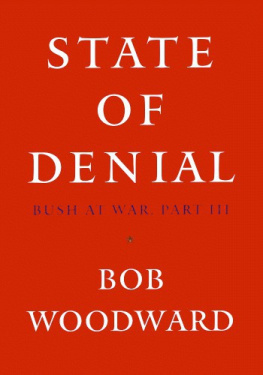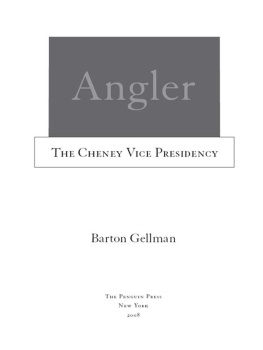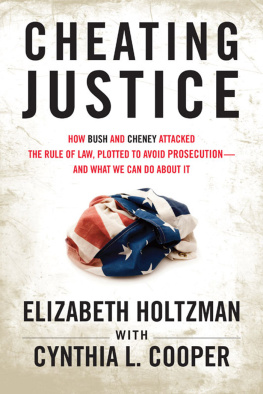PIMLICO
VICE
This eBook is copyright material and must not be copied, reproduced, transferred, distributed, leased, licensed or publicly performed or used in any way except as specifically permitted in writing by the publishers, as allowed under the terms and conditions under which it was purchased or as strictly permitted by applicable copyright law. Any unauthorised distribution or use of this text may be a direct infringement of the author's and publisher's rights and those responsible may be liable in law accordingly.
ISBN 978-1-4090-2353-1
Version 1.0
www.randomhouse.co.uk
Published by Pimlico 2006
2 4 6 8 10 9 7 5 3 1
Copyright 2006 by Lou Dubose and Jake Bernstein
Lou Dubose and Jake Bernstein have asserted their right
under the Copyright, Designs and Patents Act 1988
to be identified as the authors of this work
This book is a work of non-fiction.
The authors have stated to the publishers
that the contents of this book are true
This electronic book is sold subject to the condition that it shall not by way of trade or otherwise, be lent, resold, hired out, or otherwise circulated without the publisher's prior consent in any form other than that in which it is published and without a similar condition including this condition being imposed on the subsequent purchaser
Published in the United States by Random House,
an imprint of The Random House Publishing Group,
a division of Random House, inc., New York
Published in Great Britain in 2006 by Pimlico
Pimlico
Random House, 20 Vauxhall Bridge Road,
London SW1V 2SA
www.randomhouse.co.uk
Addresses for companies within The Random House Group Limited can be found at: www.randomhouse.co.uk
The Random House Group Limited Reg. No. 954009
A CIP catalogue record for this book
is available from the British Library
ISBN: 978-1-4090-2353-1
Version 1.0
To Molly Ivins,
a generous friend, wise and witty colleague,
and professional exemplar without peer
and
To Eve, thank you for being
INTRODUCTION
Dick Cheneybald, gray, avuncularstanding beside , Bush had failed to convince the nation that he was no longer the volatile, irresponsible first son of a political dynasty. In fact, he was perceived as a lightweight.
By selecting Cheney, Bush brought to the ticket the experience, gravitas, and wisdom he couldn't provide himself. Cheney had served three presidents, had spent ten years in Congress, and as secretary of defense had coordinated the first Gulf War. He was Bush pre's preferred candidate, the Washington insider who would provide adult supervision in the White House. Nothing exciting, just competent and steady. Dick Cheney was the safe, reassuring presence whose experience would ensure that public policy, in particular foreign policy, would not careen off track.
It's unlikely that anyone watching Bush embrace his running mate on that sticky July day in Austin anticipated the power Dick Cheney would wield as vice president. Hidden was the course Cheney planned to chart for Bush, which would lock the administration into a legacy forever defined by the war in Iraq. And while Cheney was a private man, the press had yet to realize the thick veil of secrecy behind which he would operate.
Over the course of six difficult years, Dick Cheney has become the most powerful vice president ever to occupy the office, exercising authority that often subsumes the president's. Sources who speak about him do so at great risk and usually prefer "off the record" or "background only." "You do not want to be on the Dick Cheney blacklist," says a former congressman. He has become a shadow executive who spends too much of his time in what the media refer to as "an undisclosed location" and is so obsessed with privacy that while the , and even American troops in Iraq are visible on Google Earth's satellite mapping photos, the satellite image of the vice president's residence in northwest Washington is obscured.
"Cheney has the foreign policy portfolio," says a lobbyist who served in the administration of the senior Bush. "Cheney has the Iraq portfolio. And he has the Congress portfolio. I don't know what's left." The answer is "Not much." Six years after the governor of Texas selected the CEO of Halliburton as his running mate, his presidency has been defined by foreign policy, and Dick Cheney has done the defining.
"I didn't pick Dick Cheney because of 's three electoral votes," Bush said to the cheering campaign supporters who had been bused onto the University of Texas campus. "I picked him because he is, without a doubt, fully capable of being the president of the United States."
In a very real sense, that is what has come to pass.
VICE
ONE
A Man, a Plan
and Names Named
By mid-April 2001, Dick Cheney had been vice president of the United States for less than three months. But he was already deeply involved in a series of secret meetings in his West Wing office. When more space was needed for these energy task force meetings, an employee on loan from the would schedule the ornate Vice President's Ceremonial Office in the Eisenhower Executive Office Building. The aide would also send out an e-mail designating precisely who would be allowed to attend the meetings the vice president was chairing. The April 17 list was a short one. Dick Cheney had quietly cleared his schedule to meet with a friend from Texas.
It's not likely that Dick Cheney knew at the time that was pleading for rate caps that would provide relief for the state's devastated utility companies and the consumers enduring rolling brownouts and soaring utility bills. And Enron CEO Ken Lay was flying to Washington to talk to Dick Cheney.
The vice president was waiting. Lay handed him a three-page memo outlining Enron's recommendations for the new national ."
The following day, had swept in 2000. But Cheney wanted to talk energy. That was fine with Skelton, because at that time energy was the biggest story in the state. Cheney wasn't the least bit tentative. "Price caps provide short-term relief for politicians," he said. "But they do nothing to deal with the basic, fundamental problem." Skelton pushed a little. Would the administration support temporary price caps to get the state through the summer?
"Six months? Six years?" Cheney said. "Once politicians can no longer resist the temptation to go with price caps, they usually are unable to even muster the courage to end them... I don't see that as a possibility."
California's governor, both U.S. senators, even Republicans in California's House delegation were begging the administration for price caps, or for some relief for utility rates that were forcing small-business owners to close their doors. But Cheney had already told Senator that one of the lessons he learned in the Nixon administration was that price caps don't work. Now he was calling a reporter to defend a position Ken Lay had laid out for him a day earlier. "Frankly," Cheney said, "California is looked on by many folks as a classic example of the kinds of problems that arise when you do use price caps." The vice president was such a free market zealot that he saw no government role in a utilities market that was savaging consumers. This was policy advocacy so fast and efficient that it seemed reflexive. Cheney heard from Ken Lay on Monday and called George Skelton on Tuesday, and Lay's position on price caps was laid out under the vice president's name in the Los Angeles Times on Wednesday.
The public was not aware of Lay's visit to the White House. It's not known whether Lay told Cheney that Enron was in trouble, although it seems improbable. The vice president refuses to answer the question, and Lay's death in July 2006 while awaiting sentencing for bank and securities fraud suggests we'll never know. But Cheney knew that in less than a year the wholesale cost of one megawatt-hour of electricity in California had jumped from $30 to $300up to $1,500 at peak demand times. It was also widely reported that profits earned by power producers and marketers like Enron were up 400 to 600 percent.




